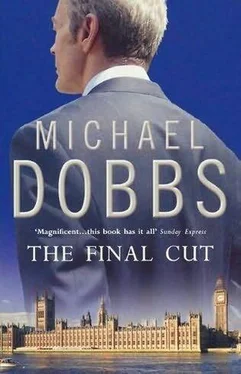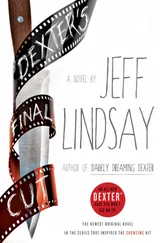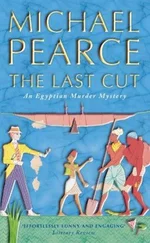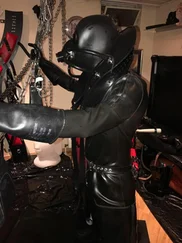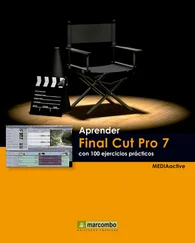Michael Dobbs - The Final Cut
Здесь есть возможность читать онлайн «Michael Dobbs - The Final Cut» — ознакомительный отрывок электронной книги совершенно бесплатно, а после прочтения отрывка купить полную версию. В некоторых случаях можно слушать аудио, скачать через торрент в формате fb2 и присутствует краткое содержание. Жанр: Политический детектив, на английском языке. Описание произведения, (предисловие) а так же отзывы посетителей доступны на портале библиотеки ЛибКат.
- Название:The Final Cut
- Автор:
- Жанр:
- Год:неизвестен
- ISBN:нет данных
- Рейтинг книги:5 / 5. Голосов: 1
-
Избранное:Добавить в избранное
- Отзывы:
-
Ваша оценка:
- 100
- 1
- 2
- 3
- 4
- 5
The Final Cut: краткое содержание, описание и аннотация
Предлагаем к чтению аннотацию, описание, краткое содержание или предисловие (зависит от того, что написал сам автор книги «The Final Cut»). Если вы не нашли необходимую информацию о книге — напишите в комментариях, мы постараемся отыскать её.
The Final Cut — читать онлайн ознакомительный отрывок
Ниже представлен текст книги, разбитый по страницам. Система сохранения места последней прочитанной страницы, позволяет с удобством читать онлайн бесплатно книгу «The Final Cut», без необходимости каждый раз заново искать на чём Вы остановились. Поставьте закладку, и сможете в любой момент перейти на страницу, на которой закончили чтение.
Интервал:
Закладка:
Riddington had on his most obstinate Dunkirk expression, but acquiesced. He gave a perfunctory nod, then turned on his heel and left.
For a long moment a complete stillness enveloped the Cabinet Room. Urquhart did not stir, did not appear to breathe. Claire, who had been sitting discreetly in a comer by the door, wondered if he had gone into a trance, so deeply did he seem to have retreated within himself. A tiny pulse on the side of his temple seemed the only sign of life, beating away the seconds until… Until. There was no avoiding it. Even he knew it. Then he returned from wherever he had been, and was with her once again.
'Like trying to stoke a furnace with dead rabbits, isn't it?' he muttered grimly.
She marvelled at his composure, admired his resilient humour. 'I wonder what he would have done,' she asked softly, indicating the portrait of Robert Walpole, the first and longest-serving holder of the office of Prime Minister.
Urquhart rose to examine the oil above the fireplace, gripping the white marble mantel. 'I've been thinking about that a great deal in these last days,' he said softly. 'They accused him of corruption, condemned him, even imprisoned him in the Tower. Called him a warmonger, even before Mr Mackintosh got his hands on the media.' His eyes seemed to dissolve like children's sweets. 'They compelled him to resign. Yet he always found a way to bounce back from disaster. Always.' 'A shining example.' 'History has a devilish strange way with the facts. I wonder whether history will be as kind with me.' 'Is it important to you?'
He turned sharply, his eyes burning with mortification. 'It's the only thing I have.'
The bitterness, hemmed around by dogged humour, was.about to burst forth but at that moment there was a commotion from the door. It burst open, and in bounced Bollingbroke, breathless. 'Et tu, Brute!' 'Beg pardon?'
Urquhart closed his eyes, shook from them the venom and self-pity, and smiled. 'My little joke, Arthur. What news of Brussels?'
'Full of bloody foreigners. Sorry not to have got here earlier, Francis.' 'You are with me?'
'Till my last breath. I dictated a statement of support to the Press Association from the car telephone on my way in.' 'Then you are doubly welcome.'
'Bloody thing is, Francis, it won't do either of us the least bit of good.' 'Why not?'
"Cos you and me are for the high jump, there's no denying it. That bugger Makepeace has got this election by the balls.' And Makepeace marched on. To Luton. Every hour brought Makepeace more support, and closer to London. With every step the march grew in size, slowing him down and giving the Metropolitan Police Commissioner cause for concern. But after the fiasco in Birmingham, he dared not bar the march from the nation's capital.
So they marched, onwards to Trafalgar Square. To Francis Urquhart's funeral pyre. He had stolen away by moonlight. Through the Downing Street press department, down into the labyrinth of corridors which connects Number Ten to the Cabinet Office on Whitehall, past the old brick walls where the Tudor King's tennis court used to be. Not even Corder was with him.
Even at midnight the centre of the city was bustling with activity, mostly vehicular, Whitehall becoming something of a race track for delivery vans and late-night buses. The activity helped hide him, ensure he did not stand out. As he came down the steps from the Cabinet Office, past the startled security guard, he ducked away from the police presence which stood at the entrance to Downing Street. George Downing himself had been a rogue, a spy for both sides in the Civil War, a man steeped in duplicities and lacking in either principle or loyalties. Educated at Harvard. And they had given him a knighthood and named the most important street in the kingdom after him. Whereas he, Francis Urquhart, would be fortunate if they allowed his name to be placed even on a headstone.
There were monuments to the dead everywhere. The Cenotaph. The Banqueting Hall beneath whose windows they had with one blow severed the head of their liege lord and king, Charles I. Statues to fallen heroes, in memoriam and immortal. The entire avenue stood on what had once been the old funeral route from Charing Cross to St Margaret's until the King, disgusted with the wailings of the common herd outside his window, built them a new cemetery at St Martin-in-the-Fields so they could bury the dead without spoiling his dinner. At night in the shadows and with a scimitar moon overhead you could all but hear the creak of ancient bones in this place, a place of remembrance. And he so wanted to be remembered. What else was there for him?
He stood on the stone bridge at Westminster, gazing down into the silty-ink tidal water which lapped against the piers, its gentle murmurs haunting like the witching calls of Sirens. An emptiness yawned beneath him which seemed to offer peace, release, as easily as falling into the open mouth of a grave. What fragments he had left to lose could so readily be given up. Yet he would not do it, take the coward's way out. Not the way to be remembered.
He rattled the spiked and rosetted gates to New Palace Yard – the Members' entrance to the precincts of the House of Commons. Members of Parliament were forbidden access to the Palace of Westminster while an election was being fought, except for the sole purpose of collecting their letters. Even during elections constituents still complained, about drains, about neighbours, about missing social security cheques, all the things that burdened a politician's life, and a carefully worded response might yet win a vote. The policeman who swung back the gate in answer to his call offered a respectful salute – Urquhart was well past, his heels clicking on the cobbles before the semi-slumbering officer had recovered sufficient wit to register what he had seen and wonder why on earth the Prime Minister was calling in person and at midnight to collect his mail. But he was entitled.
Urquhart did not head for the Members' Post Office, which in any event was closed, instead he made his way up the stairs and through the stone archways to the rear of the Chamber; he met no one. But he knew he was not alone, the echo of his footsteps accompanied him like a cohort of distant memories. He had come to the long corridor which ran behind the Chamber, usually noisy with the bustle of errands and anticipation, now ghost still. Before him stood the great Gothic doors to the anteroom of the Chamber. They should have been locked, as should the second set of doors into the Chamber itself, but electricians had been busy rewiring the sound system and the constant unlocking and relocking of doors would have put them into double-overtime. The doors swung open on their great brass hinges.
The darkness was intense, split only by pale splashes of moonlight from the high windows of the west wall, but he knew every inch by instinct. He had stepped onto this stage, the greatest stage of all, so many times yet it never failed to impose its majesty. The atmosphere, heavy with history, clung to him, lifted and elated him, he could feel the memories of centuries crowding round, the ghosts of the great whispering in the wings and waiting for him, Francis Urquhart, to join them.
He pushed his way past the waving Order Papers and jabbing elbows, stepping over the outstretched legs, making his way towards his seat. At one point he stumbled, forced to rest a hand on the lip of the Clerk's Table for support, sure he had been tripped by some extending ankle – Gladstone's, perhaps, the rakish Disraeli's or recumbent Churchill's? Did he hear the clip of a closing handbag, smell stale Havana? But then he had reached it, the space on the bench left for the Prime Minister, waiting, as it always had been, for him. He sat, embracing the formal subtlety of its leather, savouring the spice of great events which lingered in its fabric and brought forth the familiar rush of adrenalin. He was ready for them. But they were quiet tonight, everyone waiting to hear him, hanging on his every word, knowing that these were momentous times.
Читать дальшеИнтервал:
Закладка:
Похожие книги на «The Final Cut»
Представляем Вашему вниманию похожие книги на «The Final Cut» списком для выбора. Мы отобрали схожую по названию и смыслу литературу в надежде предоставить читателям больше вариантов отыскать новые, интересные, ещё непрочитанные произведения.
Обсуждение, отзывы о книге «The Final Cut» и просто собственные мнения читателей. Оставьте ваши комментарии, напишите, что Вы думаете о произведении, его смысле или главных героях. Укажите что конкретно понравилось, а что нет, и почему Вы так считаете.
